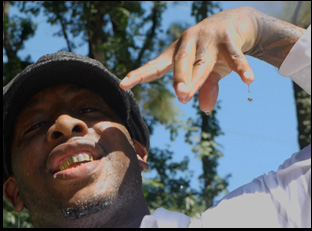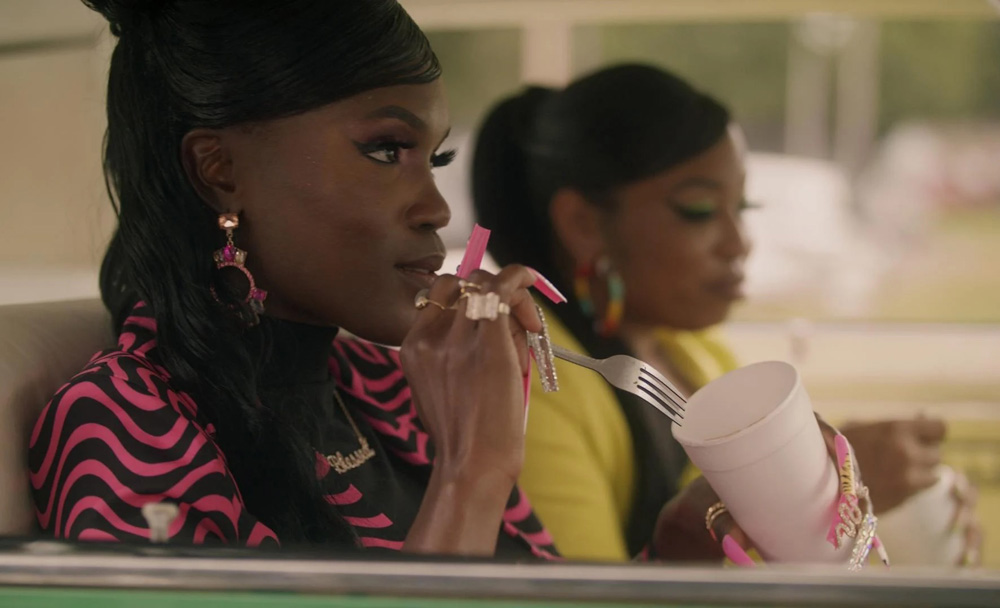“Man, you know Martin had a dream. I got one too,” Rico Golden says in “Slice,” a statement that might seem grandiose when he’s talking about the style of diving that he and others in Memphis have perfected called slicing, but then again what was the great civil rights leader talking about standing before the Lincoln Memorial but community building on an individual level that could have an enormous impact on those in search of the equality that’s been the promise of the U.S. As smoothly as Golden and his fellow slicers make their way into the water against all odds, updating fancy diving to all but freeze in the air to strike a pose before they land, director Zaire Love cuts through stereotypes regarding Black culture, observing men fearlessly thrusting themselves into the water when in post-segregation America, few are thought to even want to swim, having been prevented from dipping their toe in in the first place.
There’s an underlying idea in much of Love’s work that her central characters have had plenty to overcome to get to where they are, but the filmmaker comes in at the moment where they find joy and uses it as an opportunity to show that as galvanizing a force as any other. Having her grandmother sit in her rocking chair in the midst of a mahogany forest, as sturdy and unwavering as anything else on the land with deep roots in her first short doc “Trees,” and following a University of Mississippi men’s step squad as they proudly kick their way through the Black Greek Step Show in “Road to Step,” Love has spent the past few years bringing a spotlight to scenes from the Black Southern community that couldn’t be more luminous already yet have largely lived in the shadows for far too long.
If Love sees these moments of reverie as an opportunity to change the way the Black community sees themselves, she’s taken an exciting step forward with her other 2023 film “Etto,” her first narrative work that confronts the question directly of how Black women can short change themselves by believing that they are somehow less than when they can be dismissed as “ghetto” for expressing themselves ornately through their hair and nails. Just as with “Slice,” the artistry is made clear through Love’s lens as Blessed (Daniela Griffin) and Royal (Annsleigh Thornton) spare no expense in looking their best for a job fair, with the fact that what’s left over in their budgets can only buy them ramen noodles for sustenance, but the film turns a search for outside approval into one of self-acceptance as the two start to feel as good about how they present themselves as they look.
Set to make a splash this week with both “Slice” and “Etto” touching down in Love’s hometown this week at Indie Memphis, the multidisciplinary artist spoke about her delightful double feature and how the short films are part of a larger story she’s trying to tell, as well as how she brings her passion for music into the mix and the rewards of seeing others celebrated in her work.

Yeah, what connects them my mission to honor, amplify, and immortalize the stories and voices of the Black South, particularly ordinary Black folks who are doing extraordinary things. And with “Slice,” that’s an underground swim culture that Black folks in the city know about, and [in “Etto”] it’s Black women taking ownership of their style and their aesthetic, so [these films] definitely have their differences, but the through line in all of the work is to honor, amplify, and immortalize these Black Southern stories.
How did you find your way into the scene to tell the story in “Slice”?
Rico [Golden, the main subject] is a middle school classmate, and somehow, some way, [we] ended up friends on Facebook and while I was in my MFA program in 2019, I saw a viral video of him slicing. At that moment, I was focused on documenting the South and realized nobody had told this slicing story, and if they have, it has not been in film form, so I had reached out to him, just like, “Hey, we’ve got to do something.” But we really didn’t get around to filming until 2020.
Did you end up throwing a big pool party and making a film out of it? It’s clearly more than that, but I imagine this brought all the slicers together to show off their stuff.
Yeah, it was basically that. Hey, this is going to be a slice party, and all of the slicers come out and we’re going to have a good time, very much a natural junt. And this was how we were going to create a scene in a sense, and we invited people out to the party and people came and wanted to see the slicing, and the folks who sliced wanted to give them a show. Once we got an introduction to the subjects — Rico and Silk and Mike – and you understood their love for it, then you get to see the show and you see this is just not a solo thing, but actually a call-and-response type of experience for them. It’s not just, “We love to slice the pool,” but we also love that crowd interaction. And the louder the beat is, the greater we know that we are doing what we need to do in this pool.” And I figured that could resonate more later in the film once people understood what it was, so we could go forward in telling more of the story.
Part of the energy comes from the music, which in “Slice” you did yourself and I wondered how early in the process are you thinking about it?
I want to say music is number one, but it is definitely top three in the process of creating, of ideating, and of doing because music is like the heartbeat of our lives, so it’s very important. I will spend a significant amount of time trying to find the perfect beat, and in both films, you will hear songs from me because sometimes you can’t find what you’re looking for, so you’ve just got to make it.
In “Etto,” I wouldn’t want to spoil it too much, but you break the fourth wall with Blessed pouring out her emotions through this song from Talibah Safiya (“Ten Toes Down”). I wondered whether that was a building block for the whole film?
This scene was actually something I put in on the back end of it because we needed to see a a midnight hour change with Blessed, and I felt writing more in the script wasn’t necessarily what needed to happen and that music tells a story. My good friend Talibah Safiya is an artist here in Memphis and I love her music and she has been so supportive of the work, and if you listen to the lyrics [of “Ten Toes Down”], even though Talibah is not talking, maybe her intention was not to say that this is something that you’re talking yourself through, but maybe you’re talking to a lover through [or] to somebody else. And in this case, [I thought], this is perfect to have that midnight hour metamorphosis and kind of cleansing renewal [for Blessed], so I thought that was the perfect song to put in there and to see a change.
How did you first get the idea for “Etto”?
In 2021 was when I really got serious about it, because at that time I was wearing my hair very, very short, and I would go to the barbershop and the barber that I went to was this young lady who was doing these intricate styles, with the Marcel curlers and different weaves and weave colors, and I was [thinking] “Man, this is art.” And my aunt does hair, and growing up, you [think] “Oh, that’s ghetto,” but I’m looking at it and I’m just like, it takes a level of skill and detail and imagination and creativity to do that. If you were to put that wig in a gallery, people would think that this is a work of art, so I felt I needed to write about the creativity and the ingenuity of Black women in this space.
And so often it is appropriated and watered down, and folks who [came up with it] did not come up with the benefit from it, so I thought [at first], “Oh, I would love to do a documentary about this” and “I would love to do a gallery [show] about this” — and [in fact], we have a screening Thursday [at Indie Memphis] and then a gallery open on Friday at Christian Brothers University that highlights ghetto Black women in Memphis and in the world, so I’m super excited because I definitely want this definitely to be something that continues to live on bigger, better, greater, and contextualize in a way that folks really get the memo. But I decided to write a script [for “Etto”].
Just generally, when you obviously can pursue something so many different ways as a multidisciplinary artist, what makes a film an appealing option?
Film allows me to put a lot of my artistic interests in one place. It allows me to put my music in there because I like to write. It allows me to add my writing because I’m here for aesthetic and design, and also people are much more inclined to sit down and watch a 15-minute film than to read a piece that might be 15 minutes, so it lends itself to be accessible to folks whom I am creating and I think that’s the reason why film has been the driver of my creative interests.
In “Etto,” you’re able to showcase artistry from a number of other people as well with the beautiful production design – the flowery wallpaper – and the remarkable nails. What was that like to bring into this?
It was so exciting. Actually, my mom did the sets and she’s an interior designer in her own right, so she really did her thing. And I really loved and enjoyed being able to see my mom be in her element. This script that I wrote was just a few pieces of paper, but it manifested into something that allows several different women, particularly Black women, to express themselves in ways and feel proud, and I thought “That’s powerful.” A young lady by the name of Alexis Noble did the costumes, a young lady by the name of Zaylin did the nails, and then my aunt did the weaves and being able to see everyone’s creativity come into play was a beautiful moment.
What’s it like getting to premiere these films this week in your home town?
It feels really good in ways I don’t know the magnitude [of] until I’m in the room, or I’m in conversation with folks like you who have have watched it and have an appreciation for it. This was just an idea like a year or two ago and now it is something that we’re talking about and people are moved by, so it feels really good, not necessarily the the the glitz and glamour of it all, but the deep rooted understanding that we have the power to take an idea and bring it into fruition. People then are blessed and inspired to do what they want to do in the world because they see that it’s possible, so there’s something really special and magical and really powerful about it.
“Etto” will screen at Indie Memphis on October 26th as part of Hometowner Narrative Competition Shorts at Playhouse on the Square at 8:30 pm and “Slice” will screen at Indie Memphis as part of Hometowner Documentary Shorts on October 28th at the Circuit Playhouse. Both are available to stream until October 29th through Indie Memphis’ online platform.




